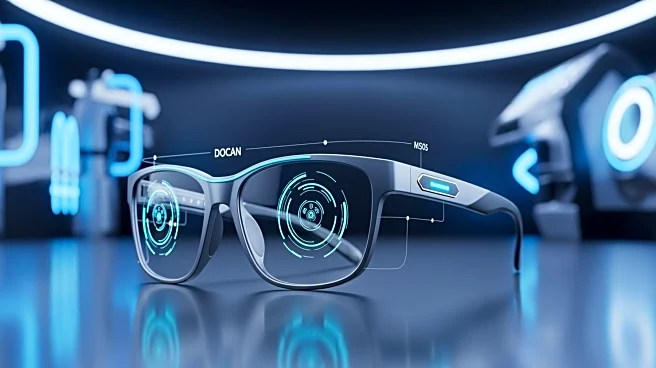What's Happening?
EssilorLuxottica, the parent company of Ray-Ban, has announced an accelerated plan to produce 10 million units of smart-glasses annually by the end of 2026. This decision follows the successful launch of the Meta Ray-Ban Display in September, which has spurred
significant consumer interest. The flagship model, priced at $799, features expanded AI capabilities and is set to roll out in Canada, France, Italy, and Britain by early 2026. The company's Q3 revenue increased by 11.7% to €6.9 billion, prompting the decision to ramp up production to meet the unexpected demand. This move is expected to bring forward the availability of these smart-glasses, potentially affecting retail strategies and pricing.
Why It's Important?
The accelerated production of smart-glasses by EssilorLuxottica signifies a shift in the wearable technology market, moving from niche to mainstream. The increased production capacity is likely to lead to wider retail availability and potentially higher average selling prices, anchored by the $799 flagship model. This development could impact various stakeholders, including retailers, app developers, and privacy advocates. Retailers may need to adjust inventory plans, while app developers might face challenges due to the current lack of third-party applications. Privacy advocates have raised concerns about the potential for increased data collection without adequate safeguards.
What's Next?
As EssilorLuxottica moves forward with its production plans, retailers and partners are expected to adjust their strategies to accommodate the increased supply. The market will closely watch consumer demand during the October-December period to determine if early adopters transition into mainstream buyers. Additionally, there may be increased pressure on regulators to address privacy concerns associated with the new smart-glasses. The debate over privacy and data collection is likely to continue, influencing how and where these devices are sold.
Beyond the Headlines
The rapid advancement in smart-glass technology could have long-term implications for consumer privacy and data security. As these devices become more prevalent, the need for robust privacy regulations will become increasingly important. The integration of AI features in smart-glasses also raises questions about the ethical use of such technology, particularly in terms of data collection and user consent. The industry will need to balance innovation with responsible practices to ensure consumer trust.

















